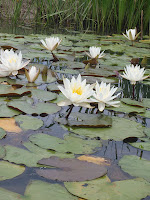When:
September 27 from 8:00am - 3:30pm
Transportation: Meet at the Watauga County Agricultural Conference Center at 8:00am (252 Poplar Grove Rd.) to load the 12 passenger van.
Where: Walnut Cove is about 2 hours from Boone, located just northeast of Winston Salem.
Cost: $25 and includes transportation, lunch, and tour.
To register: please contact Wendy Patoprsty at (828)264-3061 or email Wendy_Patoprsty@ncsu.edu Space is limited so reserve your spot as soon as possible.
In 1994, officials in the small North Carolina town of Walnut Cove were considering building a conventional wastewater treatment plant that would use both mechanical and biological processes to clean wastewater. As the original cost estimate of $2 million kept rising, Wayne Smart-- then a member of the Walnut Cove Board of Commissioners-- proposed a wastewater wetlands as an inexpensive alternative to a conventional sewage plant. Although many town officials, consulting engineers, and residents were skeptical, the wastewater wetlands system was eventually built, and began operating in 1996.
Transportation: Meet at the Watauga County Agricultural Conference Center at 8:00am (252 Poplar Grove Rd.) to load the 12 passenger van.
Where: Walnut Cove is about 2 hours from Boone, located just northeast of Winston Salem.
Cost: $25 and includes transportation, lunch, and tour.
To register: please contact Wendy Patoprsty at (828)264-3061 or email Wendy_Patoprsty@ncsu.edu Space is limited so reserve your spot as soon as possible.
In 1994, officials in the small North Carolina town of Walnut Cove were considering building a conventional wastewater treatment plant that would use both mechanical and biological processes to clean wastewater. As the original cost estimate of $2 million kept rising, Wayne Smart-- then a member of the Walnut Cove Board of Commissioners-- proposed a wastewater wetlands as an inexpensive alternative to a conventional sewage plant. Although many town officials, consulting engineers, and residents were skeptical, the wastewater wetlands system was eventually built, and began operating in 1996.
The system, which cost less than
$1 million to build, is less expensive to run than a conventional wastewater
treatment plant because it does not have to be overseen 24 hours a day, since
nature and gravity do most of the work, said plant operator Mark Bowman. The
process of treating the wastewater is started with the water being sprayed into
the air to add oxygen and promote microbial activity. The water works its way
through a series of ponds, passing through thick groves of cattails that help
to filter out nitrogen phosphorous ammonia and other naturally occurring
chemicals. The water is then chemically treated to remove any remaining germs,
which leaves the plant cleaner than the creek water it flows into, operators
say. Smart says that the system has already exceeded most people's
expectations, as it has proven itself to be an economically and environmentally
responsible way of dealing with waste. Here is a link to their website for even more information..... http://www.townofwalnutcove.org/water-sewer.html








